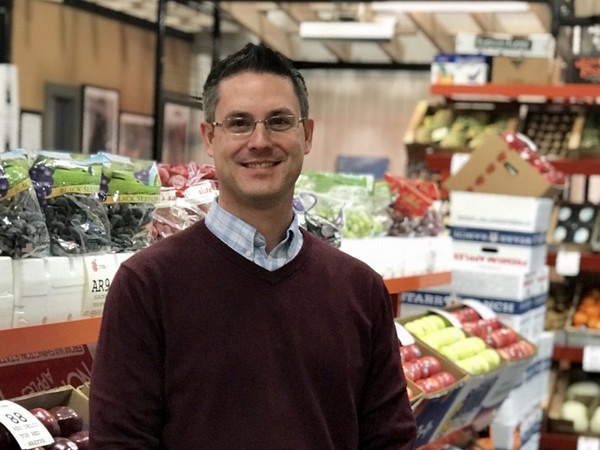Like many businesses, the Philadelphia Wholesale Produce Market (PWPM) made changes to its businesses amidst the pandemic.
For one, its hours have been adjusted—closing time is now at 10 a.m. for instance rather than 1 p.m. to accommodate the increases in the cleaning and sanitization schedules. Other changes include putting in place several personal protective measures such as requiring masks for those who enter the market and merchants themselves have invested in plexiglass and social distancing barriers.
“Around the clock, HVAC tech crews also monitor appropriate temperature and air quality. And the merchants, in cooperation with market, continue to be vigilant around food handling, customer interaction and employee health,” says Mark Smith, General Manager of the PWPM.
 Mark Smith, General Manager of the Philadelphia Wholesale Produce Market.
Mark Smith, General Manager of the Philadelphia Wholesale Produce Market.
What has also changed somewhat are customer demands. “A reduction of foodservice business--restaurants, schools, stadiums, bars, etc.—has led to an increase of retailers purchasing in greater quantities as well as innovative new companies that have been springing up,” says Smith, adding that the market has also remained open to the public.
New customers have emerged too. “And there’s been increased demand in neighborhood-focused stores and ethnic retailers including Latino, Indian, Eastern European, Asian, Middle Eastern and African. Operators of home delivery services and open-air markets are popping up as well,” says Smith, noting that one new client includes GrowNGo, a virtual grocery store that offers delivery services.
Changes to pack sizes
The change in retail has also led to a shift in pack sizes as well. “Many merchants have repacked foodservice size items to retail manageable sizes. Also, buyers are requesting more delivery and flexibility with payments, which the merchants are trying to accommodate where they can,” says Smith.
As far as products that have grown in demand throughout the pandemic, Smith cites items such as citrus, apples, bananas, turmeric and garlic. “All of these products seem to have stability and/or health benefits,” he says.

What’s also grown for the PWPM are its waste reduction efforts—in the last six months, the market has reduced its waste by 80 percent. And to help continue with its goal of zero-waste, the market has started initiatives such as a partnership with Natural Upcycling, a New York-based waste collection company that recycles organic or food waste and turns it into a renewable resource.
Looking ahead though, as the pandemic works through its second wave and lockdowns are in place or looming, those with the market remain rest assured. “As an essential business, we’ve remained open throughout the pandemic and we anticipate that will continue and we’ll do our best to ensure a safe environment,” says Smith. “We’ll keep adapting and innovating through the winter depending on the needs of our customers. We expect that demand for produce will continue to be strong.”
For more information:
Christine Hofmann
Philadelphia Wholesale Produce Market
Tel: +1 (215) 336 3003
christine@pwpm.net
www.pwpm.net

